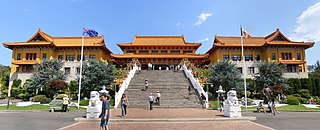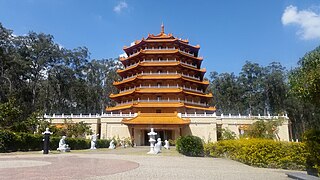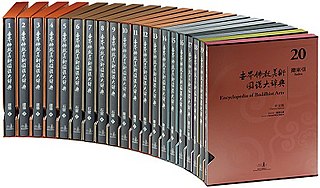
Fo Guang Shan (FGS) (Chinese: 佛光山; pinyin: Fó guāng shān; lit. 'Buddha's Light Mountain') is an international Chinese Mahāyāna Buddhist organization and monastic order based in Taiwan that practices Humanistic Buddhism whose roots are traced to the Linji school of Chan Buddhism. The headquarters, Fo Guang Shan Monastery is located in Dashu District, Kaohsiung, and is the largest Buddhist monastery in Taiwan. The organization is also one of the largest charity organizations in Taiwan. The organization's counterpart for laypeople is known as the Buddha's Light International Association.

Hsing Yun was a Chinese Buddhist monk, teacher, and philanthropist based in Taiwan. He was the founder of the Fo Guang Shan Buddhist monastic order as well as the layperson-based Buddha's Light International Association. Hsing Yun was considered a major proponent of Humanistic Buddhism and one of the most influential teachers of modern Taiwanese Buddhism. In Taiwan, he was popularly referred to as one of the "Four Heavenly Kings" of Taiwanese Buddhism, along with his contemporaries: Master Sheng-yen of Dharma Drum Mountain, Master Cheng Yen of Tzu Chi and Master Wei Chueh of Chung Tai Shan.

Fo Guang Shan Hsi Lai Temple is a mountain monastery in the northern Puente Hills, Hacienda Heights, Los Angeles County, California. The name Hsi Lai means "coming west".

Hsin Ting is a Buddhist monk from Taiwan and senior elder of the Fo Guang Shan order. He served as the third abbot and director of the order from 1997 to 2005. He served as acting abbot for three years after the death of his predecessor, Hsin Ping, in 1995. From 2004 to 2010, Hsin Ting served as the president of Buddha's Light International Association. Hsin Ting was later appointed the abbot of Tai Hua Temple in Bangkok, Thailand, assisting in overseeing the construction project for Fo Guang Shan's satellite branch temple in Southeast Asia.

Fo Guang Shan Nan Tien Temple is a Buddhist temple complex located in Berkeley, on the southern outskirts of the Australian city of Wollongong, approximately 80 kilometres (50 mi) south of Sydney.

Fo Guang University is a private university in Linmei Village, Jiaoxi Township, Yilan County, Taiwan. It was founded by the Chinese Mahāyāna Buddhist monastic order Fo Guang Shan in 2000 and as such represents the culmination of education efforts of the order that started in 1963 with establishing Chinese Buddhist Research Institute at Fo Guang Shan.

Humanistic Buddhism is a modern philosophy practiced by Buddhist groups originating from Chinese Buddhism which places an emphasis on integrating Buddhist practices into everyday life and shifting the focus of ritual from the dead to the living.

Fo Guang Shan Nan Hua Temple is the largest Buddhist temple and seminary in Africa, and is situated in the Cultura Park suburb of Bronkhorstspruit, South Africa. It is the African headquarters of the Fo Guang Shan Order, covering over 600 acres (2.4 km2). Fo Guang Shan was established in 1967 by Venerable Master Hsing Yun, and is a Mahayana Chinese Buddhism monastic order. The Temple, like its mother order in Taiwan, follows the Linji Chan school of Buddhism as well as the Pure Land School.

Chung Tian Temple is a Chan Buddhist temple located at 1034 Underwood Road, Priestdale, Queensland, Australia. The temple is part of the Fo Guang Shan Buddhist monastic order. Construction of the temple began in January 1991 and it opened in June 1993. Chung Tian Temple was founded by Venerable Master Hsing Yun, who is also the founder of the Fo Guang Shan Buddhist order.
Nanhua University is a university located in Dalin Township, Chiayi County, Taiwan. Founded in 1996 as the Nanhua College of Management, it was elevated to university status in 1999. The university was founded by the Buddhist monk Hsing Yun of Fo Guang Shan. In 2022, Times Higher Education's World University Rankings ranks NHU as 95th of the "Impact Rankings: Reducing inequalities" in the world.

Fo Guang Shan Mabuhay Temple is the Philippine branch of the Taiwan affiliated Fo Guang Shan Buddhist Order in the Philippines. As do all branch temples, way-places, and organizations of Fo Guang Shan, the branch follows Humanistic Buddhism, a modernized style of Buddhist teaching as propagated by Hsing Yun, spiritual founder and teacher of the order.

Prince Siddhartha the Musical is an original musical production by Chu Un Temple, and directed under the Fo Guang Shan Academy of Art of the Philippines. The musical is an adaptation of The Biography of Sakyamuni Buddha, written by Buddhist monk Hsing Yun, founder of the Fo Guang Shan Buddhist Order in Taiwan.

Yifa is a Taiwanese scholar and writer and the founder of the organization, Woodenfish Foundation. She is a nun ordained in 1979 by Fo Guang Shan, a Buddhist organization in Taiwan. Yifa holds a law degree from the National Taiwan University, a masters in comparative philosophy from the University of Hawaiʻi, and a doctorate in religious studies from Yale University. She served as a department head and dean of University of the West during her tenure at the college.

The Fo Guang Shan Buddhist Temple of New Zealand is a temple and community centre of the Fo Guang Shan Chinese Buddhist movement in the East Tāmaki/Flat Bush suburb of Auckland, New Zealand. The temple and complex were built over seven years. It was designed in the architectural style of the Tang dynasty. The temple also includes a large Buddha statue and a two-tonne bell.

Ananda Wahihana Palliya Guruge, known as Ananda W. P. Guruge, was a Sri Lankan diplomat, Buddhist scholar and writer. Guruge was the former Ambassador Extraordinary and Plenipotentiary of Sri Lanka to UNESCO, France, and United States during the period from 1985 to 1994. Guruge was adjunct professor of Religious Studies at Cal State Fullerton and was the dean of academic affairs at University of the West.

The Zu Lai Temple is a Buddhist temple in Cotia, São Paulo, Brazil. It is the largest Buddhist temple in South America with 10,000 square meters of constructed area, inside an area of approximately 150,000 square meters. It is a branch temple of the Fo Guang Shan order in Taiwan, practicing the Mahāyāna branch of Buddhism. The Zu Lai Temple states as its main objective the cultural and religious dissemination of the Buddhist Tradition, whilst trying to reach to the general population the teachings of traditional Buddhist education, culture and meditation.

Encyclopedia of Buddhist Arts is a set of books that was started by the founder of Fo Guang Shan, Venerable Master Hsing Yun. The project started in 2001 and was completed in March 2013. There are 20 volumes in total and the artwork spans all 5 continents with information from more than 30 countries. The project was made possible with the help of numerous scholars and volunteers, 300 monastics, 140 scholars from 16 different countries, and more than 400 volunteers. Fo Guang Shan has donated copies of the encyclopedia to libraries and academic institutions across the world.
The Four Heavenly Kings or Four Great Mountains四大名山 of Taiwan refers to four Buddhist masters in Taiwanese Buddhism who each founded an influential Buddhist institution in the country. The term draws its name from the Four Heavenly Kings who each rule over one of the heavenly realms in Buddhist cosmology. Like the Four Heavenly Kings mythology, each Buddhist teacher corresponds to one cardinal direction, based on where their organization is located in Taiwan. The corresponding institutions of the masters are referred to as the "Four Great Mountains".
The Four Great Mountains of Taiwan refers to a group of four prominent organizations in Taiwanese Buddhism. The term draws its name from the Four Sacred Mountains of China, four mountains in mainland China that each hold sacred Chinese Buddhist sites. The founders of the institutions are collectively referred to as the Four Heavenly Kings of Taiwanese Buddhism. Each of the "Four Heavenly Kings" corresponds to one cardinal direction, based on where their organization is located in Taiwan. The institutions that make up the "Four Great Mountains" of Taiwanese Buddhism are:
The Fo Guang Buddhist Temple of Boston (FGBTB) (Chinese: 佛光山波士頓三佛中心; pinyin: Fóguāng Shān Bōshìdùn Sān Fó Zhōngxīn) is a branch of the Fo Guang Shan international Chinese Mahāyāna Buddhist order. It is the first temple that Fo Guang Shan Temple established in Massachusetts.

















